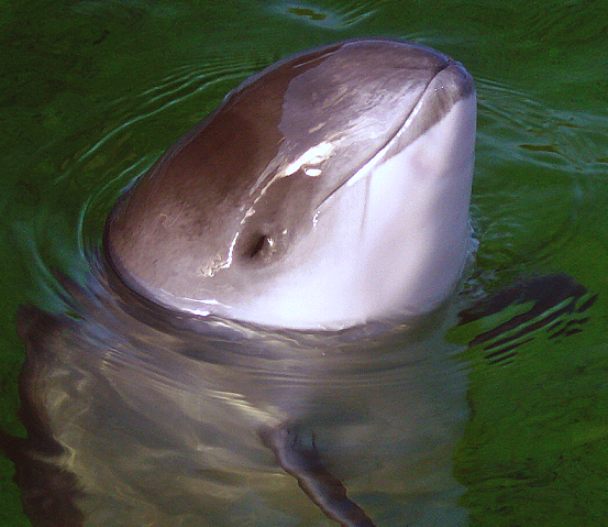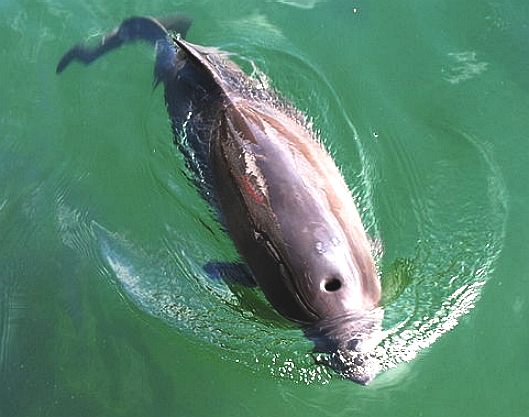|
THE HARBOUR PORPOISE
|
||||||||||||||||||||||||||||||||
|
PHOCOENA PHOCOENA
The Harbour Porpoise
Adult
males weigh about 7 kg and are less than 2 m long.
Females are equally long and weigh 55-60 kg.
Life expectancy is about 30 years.
The upper body is dark grey, the sides lighter, and the
underbelly white. Dark
stripes between the small flippers and the mouth.
The dorsal fin is a low triangle.
Each jaw has 40-60 paddle-like teeth.
Diving time is usually 2-6 minutes and the whale dives
down to 10-100 m for food.
Its diet is mainly fish, but also squid and krill.
Porpoises are found in shoals of 2-10, but sometimes
200-300 are seen together.
They seldom leap out of the water.
Conservation
Interactions with fisheries
Ecology
Harbour porpoises tend to be solitary foragers, but they do sometimes hunt in packs and herd fish together. Young porpoises need to consume about 7% to 8% of their body weight each day to survive, which is approximately 15 pounds or 7 kilograms of fish. Significant predators of harbour porpoises include white sharks and killer whales (orcas). Researchers at the University of Aberdeen in Scotland have also discovered that the local bottlenose dolphins attack and kill harbour porpoises without eating them due to competition for a decreasing food supply
LINKS
Environmentalists hope to save the whales - again
Japan
backs Iceland's whaling decision Seattle Post
Intelligencer -
Greens dismayed at Iceland whaling decision Scoop.co.nz (press release), New Zealand - hiatus is being greeted with dismay by Green Party Conservation Spokesperson Metiria Turei. ...
Iceland
to Resume Commercial Whaling
Los Angeles Times, CA -
Green
warrior to come to Iceland IcelandReview, Iceland -
Today's
Scoop Just Politics News Summary
Update:
Finnair strike expected to continue next week
International Herald Tribune, France -
Tharp She Gets Shot! The Return of Whaling in Iceland
Plenty Magazine, NY -
Whaling
is affecting tourism IcelandReview, Iceland -
Iceland,
Whales, Politics
FiNS Magazine, Singapore -
Iceland
to resume commercial whaling after almost 2
decades
USA Today 17-10-06
Iceland's Whaling Comeback - Preparations for the Resumption of ... The
Whale and Dolphin Conservation Society (WDCS) is the leading
international charity dedicated solely to the worldwide conservation and
welfare of all ... www.wdcs.org/dan/publishing.nsf/
BBC NEWS | Science/Nature | Moves begin on Iceland's whaling Iceland's ambassador to Britain is summoned to explain his country's return to commercial whaling. news.bbc.co.uk/1/hi/sci/tech/6064028.stm
BBC NEWS | Science/Nature | Iceland bids to resume whaling Iceland reveals its plans to catch whales again for the first time since 1989, despite the international whaling moratorium. news.bbc.co.uk/1/hi/sci/tech/2910655.stm
Iceland Whaling v/s Whale watching. Whaling v/s Whale watching. The most commonly used argument in Iceland is that whaling must be resumed before the whales start ... Yearly report on Iceland whale watching industry: ... www.global500.org/news_83.html
My opinion: Iceland's reasons for scientific whaling are FUBAR and if we can ... I wonder how many of you criticising Iceland's whaling have actually read ... weblog.greenpeace.org/iceland/archives/001530.html
Stop Icelandic Whaling: Arctic Sunrise Expedition 2005, Stop Icelandic Whaling: Arctic ... tourism in Iceland IF Iceland discontinues whaling. One Icelandic ... weblog.greenpeace.org/iceland/archives/2003_09.html
Greenpeace 'disappointed' by Iceland's whaling plans. 19/10/2006 Greenpeace
says it is very disappointed Iceland has decided to resume
commercial whaling Iceland has authorised an annual hunt of 30
minke and nine of the ...
Iceland's
whaling proposal threatens its growing whale-watching industry.
In 2002, more than 62000 people went whale-watching in Iceland.
...
Japan backs Iceland's whaling decision - Yahoo! News Major
pro-whaling nation Japan on Wednesday welcomed Iceland's
decision to resume commercial whaling, saying Iceland's
catch won't "endanger the whale ...
Whales on the Net - Iceland Whaling Protest Letter I am appalled to learn that Iceland has decided to resume commercial whaling under the guise of scientific research, and plans to kill 38 minke whales this ... www.whales.org.au/alert/iceletter.html
New energy drinks for performers .. Thirst for Life
330ml Earth can - the World in Your Hands
|
||||||||||||||||||||||||||||||||
|
This website is Copyright © 1999 & 2017 Cleaner Ocean Foundation. The blue bird logos and name Solar Navigator are trademarks. The name '1824' is a trade mark of Solar Cola Ltd. All rights reserved. Cleaner Ocean Foundation is an educational charity. |
||||||||||||||||||||||||||||||||



